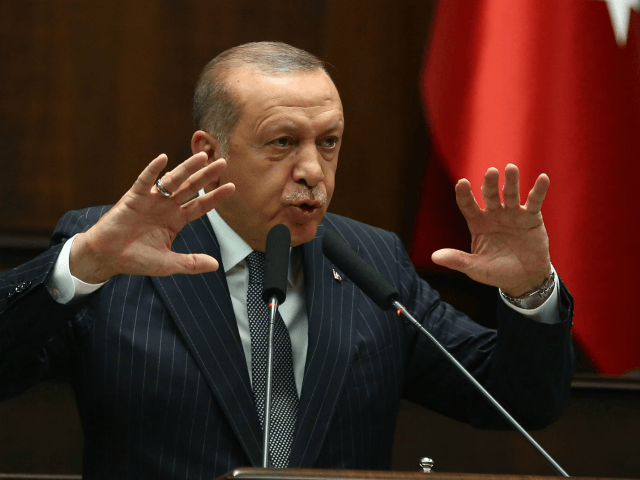Turkish President Recep Tayyip Erdogan penned a New York Times opinion column published Monday in which he offered Turkey’s guidance in rebuilding the government of northern Syria without the presence of the Syrian Kurdish People’s Protection Units (YPG/YPJ), America’s closest battlefield ally in the country.
With his entry on the New York Times opinion page, Erdogan joins the likes of allies Vladimir Putin of Russia and Nicolás Maduro of Venezuela.
Erdogan suggested that Turkey could help build a YPG-free, diverse governing coalition in Kurdish northern Syria once American troops withdraw from the area, praising President Donald Trump for announcing last month that he intends to pull troops out of the Syrian battlefield as soon as possible. Notably absent from Erdogan’s vision for political leadership in Syria is dictator Bashar al-Assad, who now controls most of Syria after repeatedly using chemical weapons to eliminate rebel groups in major cities like Homs and Aleppo. Erdogan, who once promised to “end the rule of the tyrant Assad,” does not once mention the head of state in the piece.
Instead, he proposes the creation of a Syrian rebel government in Rojava, or Syrian Kurdistan, to replace the current Kurdish leadership there.
The Kurdish People’s Democratic Union (PYD) currently controls northern Syria and works in tandem with the U.S. government to combat jihadist threats through its YPG/YPJ. The YPG, the main group in the Syrian Democratic Forces (SDF) coalition, were largely responsible for the defeat of the Islamic State in Raqqa, its “capital,” in late 2017.
Despite their role in defeating ISIS, Erdogan’s regime considers the YPG indistinguishable from the Kurdistan Workers’ Party (PKK), a U.S.-designated Marxist terrorist organization.
“Under wartime conditions, many young Syrians had no choice but to join the P.Y.D./Y.P.G., the Syrian branch of the P.K.K., that Turkey and the United States consider a terrorist organization,” Erdogan wrote in the Times. “According to Human Rights Watch, the Y.P.G. militants have violated international law by recruiting children.”
“Following the United States withdrawal from Syria, we will complete an intensive vetting process to reunite child soldiers with their families and include all fighters with no links to terrorist organizations in the new stabilization force,” Erdogan promised.
The Turkish president promised to “get the job done in Syria” by building a new government in the nation’s north administered by Turkish leaders loyal to Erdogan.
“Turkish officials with relevant experience will advise them on municipal affairs, education, health care and emergency services,” he said of the proposed new government.
Erdogan writes that “President Trump made the right call to withdraw from Syria,” but without Turkish control of northern Syria, “the same mistake” of U.S. withdrawal in Iraq can occur. “The United States withdrawal, however, must be planned carefully and performed in cooperation with the right partners to protect the interests of the United States, the international community and the Syrian people.”
He goes on to subtly suggest that an American role in this reconstruction of Syria is dangerous because American trops have “little or no regard for civilian casualties.” Instead, he argues that “Turkish troops and fighters of the Free Syrian Army went door to door to root out insurgents in Al Bab, a former stronghold of the so-called Islamic State,” limiting civilian casualties.
The Free Syrian Army (FSA) is a coalition of mostly Arab Sunni fighters of nearly every political stripe who oppose Assad. During the Obama administration, Washington held the group up as the example of the “moderate” rebels that the world should support, offering them limited aid, and only to “vetted” members of the coalition. By 2014, however, various factions of the group began splintering off into the Islamic State; others remained loyal to al-Qaeda of its Nusra Front offshoot. The few that have avoided turning to jihadist groups have taken to fighting with Turkish support against the YPG.
At the time of the 2017 al-Bab liberation operation, observer groups did not brand it as clean an operation as Erdogan did in the New York Times this week. Turkish airstrikes on the city yielded an “unexpectedly long and bloody” conflict killing hundreds of civilians.
More recently, Kurds have accused the FSA of human rights violations against their fighters, including the publication of a video purporting to show FSA fighters mutilating the corpse of a YPJ fighter (the YPJ is the all-female counterpart to the YPG). In areas of Rojava where the Turkish military and the FSA have already taken over, local Kurds complain that Kurdish language and culture have been essentially criminalized in an act of “ethnic cleansing.”
Erdogan’s column appears to have been submitted to the New York Times before National Security Advisor John Bolton told reporters Sunday that there would be no sudden American withdrawal from northern Syria, and no withdrawal at all if Turkey does not guarantee the security of Syrian Kurds. Erdogan called Bolton’s remarks “unacceptable,” refused to meet with him in Ankara on Monday, and complained that Washington was sending mixed messages on its troop presence.

COMMENTS
Please let us know if you're having issues with commenting.